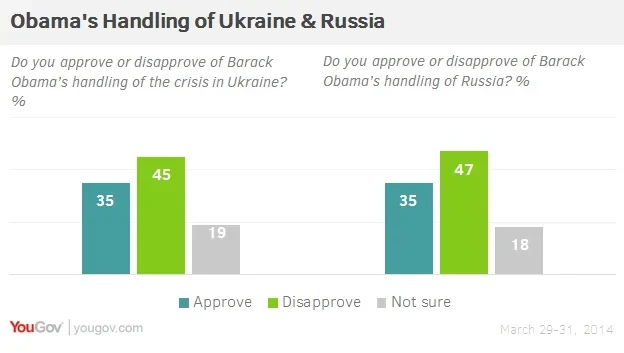Most Americans suspect that Russian territorial aims don't stop in Crimea, but most also oppose any US involvement in Ukraine
Most Americans believe that Russia – which has now annexed Crimea -- will attempt to take control of more of Ukraine and will try to re-establish control over other areas that were part of the former Soviet Union. Some see Russia’s territorial goals even extending into Eastern Europe. But despite these concerns, there is little indication in the latest Economist/YouGov Poll that the public wants the United States to get involved in the conflict – or even to increase its defense spending against Russia.
Americans perceive Russian expansionism mostly in terms of a Russian desire to return to the borders of the former USSR. 60% believe that Russia will move against other parts of Ukraine, and 61% think it will try to re-establish control over the other parts of the old Soviet Union (which have become independent states like Lithuania, Estonia, Latvia, Georgia, Azerbaijan and Belarus, among others).
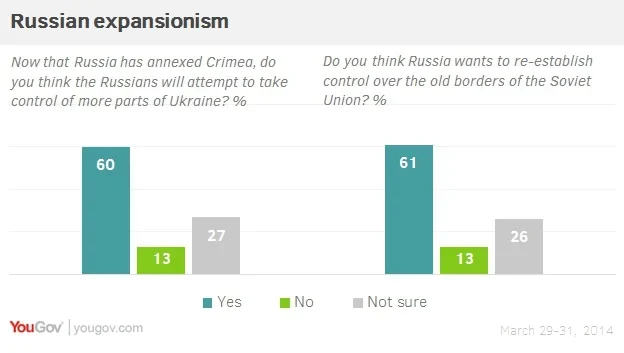
The concern comes across the board. Those paying very close attention to the events in Ukraine are especially worried. 71% of them think Russia has ambitions to re-establish the former Soviet Union.
Attention to recent events in this area is highest among those 65 and older. Not only does this age group usually report being more interested in news and public affairs than other age groups do, but in addition those 65 and older have lived the majority of their lives in the era of Cold War competition between the United States and the Soviet Union. Senior citizens consistently are more likely than other age groups to think that Russia has expansionist goals. Just under half of them say that Moscow would like to take control of other parts of Eastern Europe. 37% overall say this is something Russia wants to do.
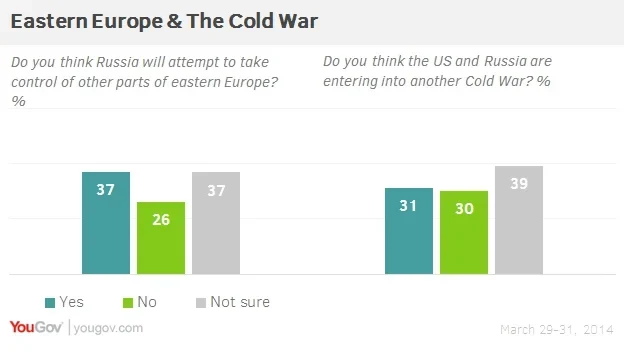
The perception that Russia wants to reassert control over its former Soviet states (though not necessarily over all of Eastern Europe) may explain why some Americans disagree with their President’s description of Russia as a “regional power,” and not a global one. 42% in this week’s poll would call Russia a “global power.” 34% agree with the President’s description.
In previous Economist/YouGov Polls, half the public described Russian President Vladimir Putin as a threat to the United States, and most say Russia is unfriendly or an enemy. But Americans aren’t sure the two countries are about to enter another Cold War. They are closely divided on this; many aren’t sure.
There is more concern about this from Republicans than from Democrats: 40% of Republicans and only 24% of Democrats say the U.S. is on the verge of another Cold War.
That doesn’t mean most people think things are better today than they were more than 25 years ago during the Cold War. Just over one in five say Russia is friendlier today than it was then or that the world is safer today than it was during the Cold War. Just as many people say the world was safer before the dissolution of the Soviet Union.
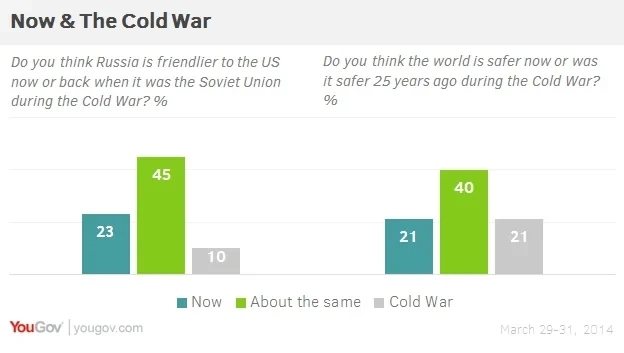
The more common perception in both questions is that things haven’t changed much: the world is just as safe now as then, and Russia is just as friendly (or unfriendly) today as it was during the Cold War.
There is little interest in taking strong action regarding Ukraine or Russia. 20% say the U.S. should get involved, but 56% say it should not. Just 19% think the U.S. should spend more on defense against Russia. There is more support for action and increased defense expenditures from Republicans than from Democrats. A third of Republicans would spend more on defense; only 10% of Democrats would. Still only one in four Republicans would have the United States get involved in the Ukraine dispute. Among those following events in Ukraine very closely, opinion is closely divided on whether or not the United States should get involved.
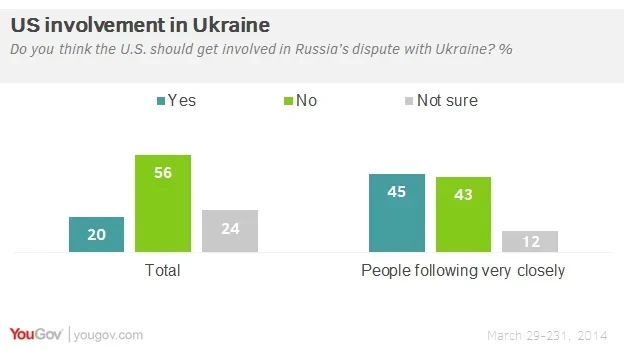
Interest in getting involved hasn’t changed very much since the beginning of the Ukraine crisis.
There is no easy way out for President Obama in this situation. More disapprove than approve of his handling of Ukraine; more disapprove than approve of his handling of Russia.
